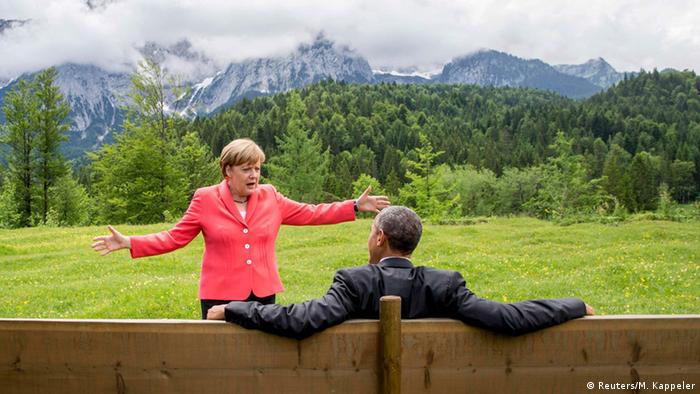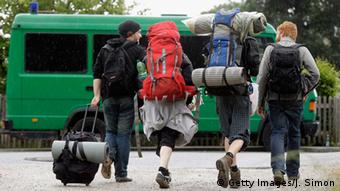The G7 is drawing to a close in Bavaria. While the summit was overshadowed by crises in Ukraine and Greece, progress was made on climate change. Naomi Conrad reports from Garmisch-Partenkirchen.
Early Monday morning, the clouds were draped like huge grey ribbons around the snow-capped mountains that tower over the quaint Alpine resort of Garmisch-Partenkirchen. In the lush valley below, a small, rather bedraggled group of protesters gathered in the square outside the town's train station, as journalists and policemen looked on.
David Grube, a polite young baker from a nearby village dressed entirely in black, conceded that most of his fellow protestors, who had weathered pouring rain and police checkpoints to demonstrate against the annual meeting of G7 leaders in the nearby Elmau Castle, had already left. He shrugged: "You know, all of this, it's exhausting."
Beside him, his friend who preferred to remain anonymous, nodded. They had arrived on Friday, they said - as an elderly man to their left posed for a photographer brandishing his sign reading "G7 go to hell" - to demonstrate against a meeting they both slammed as being excessively expensive and exclusive. They were, they said, very much looking forward to going back home.
From G6 to G8 to G7
The G7 began in 1975 as the Group of Six - the United States, the UK, Italy, France, Japan and Germany - as an informal forum for leaders to discuss issues of global importance for the leading industrialized nations at the time. Canada joined the following year, Russia in 1998, thereby creating the Group of Eight. But this year, President Vladimir Putin was notably absent from the meeting, after his country's expulsion from the group in 2014 after its annexation of Crimea.
This year, leaders discussed a broad agenda ranging from climate change, international terrorism and trade to poverty reduction. But discussions also focused on Ukraine and Russia. The leaders of the Group of Seven nations "all agree," Merkel told journalists after the meeting on Monday afternoon that sanctions against Russia over its actions in Ukraine had to remain in place until a ceasefire in the east of the country was fully implemented. The statement led to a flurry of activity in the international press center in Garmisch-Partenkirchen. The chancellor also warned that G7 leaders were ready to toughen sanctions over Moscow's role in the Ukraine conflict.
Breakthrough in climate change?
In the joint communiqué, which covered a range of topics but made few concrete commitments - as is often the case at such summits - leaders did commit to keeping global warming at two degrees in an attempt to tackle climate change and to phase out the use of fossil fuels by the end of the century.
She and her counterparts, Merkel said, had committed themselves to "decarbonizing the global economy in the course of this century," using the technical term for ending the use of oil, gas and coal and replacing them with alternative energies. Leaders also reaffirmed their "strong commitment" to jointly mobilizing $100 billion (90 billion euros) a year by 2020 for climate change mitigation in the countries most affected.
Lutz Weischer, of the German environmental NGO Germanwatch, told DW that the decisions on climate change constituted an "important moment in the international climate debate." The commitment to global decarbonization, he added, was "a significant step."
Samantha Smith, who leads the WWF's global climate and energy initiative and was also in Garmisch-Partenkirchen, was less enthusiastic: "The G7 have given us some important political signals, but they've left out the concrete commitments from themselves as nations," she told DW. Concrete, immediate actions to cut emissions, Smith added, "would have had a big impact," particularly in the run-up to the summit. She did, however, call an initiative agreed by leaders to roll out renewable energies in Africa and other emerging countries "very positive."
Merkel also said leaders had committed themselves to creating a so-called Vision Zero Fund, which would guarantee sustainable supply chains by financing preventative measures to guarantee safety standards, such as fire safety measures. Concrete financial pledges were, however, not made in the 17-page communiqué, which was hammered out by the delegations on the sidelines of the meeting. Leaders also pledged to lift 500 million people in developing countries out of hunger and malnutrition by 2030 - also without making concrete financial commitments.
Few concrete commitments
Among the plethora of other topics, ranging from coordinating research on neglected tropical diseases and resistance to antibiotics to empowering women, the leaders also pledged to help Tunisia better protect its border to neighboring war-torn Libya. "We'll continue to work with our partners in Africa, to get Ebola cases down to zero," US President Barack Obama promised. G7 leaders urged Libyan factions to put down their arms and work together. "The time for fighting has passed, the moment for bold political decisions has come," leaders said in the communiqué.
Furthermore, leaders committed themselves to furthering bilateral trade agreements, including the controversial EU-US free trade agreement TTIP. Merkel said leaders had agreed to push for "considerable progress" by the end of this year. "I intend to get it done," Obama added.
It's a promise that's unlikely to please David Grube and his fellow protesters who packed their bags and left Garmisch-Partenkirchen long before the doors opened on Monday afternoon for the post- summit press conferences: When asked about his feelings on free trade, he shrugged: "There's no need to say much, really. I mean, almost everyone's against free trade here." His friend nodded.



No comments:
Post a Comment